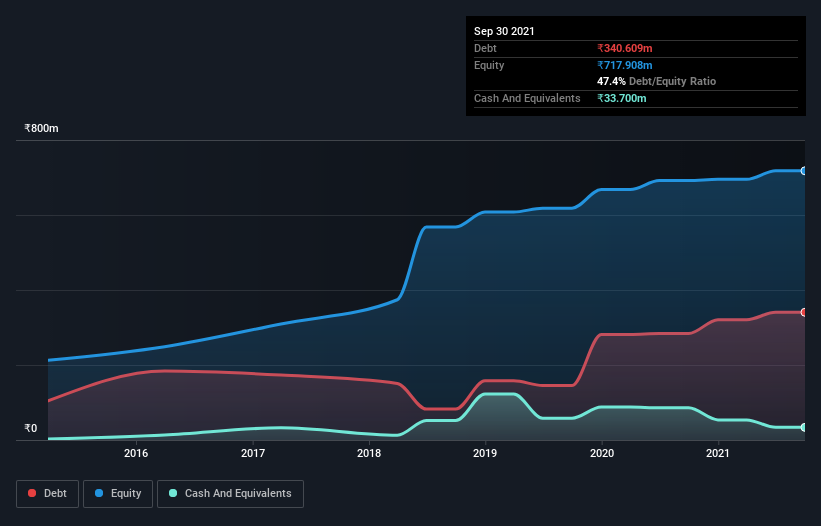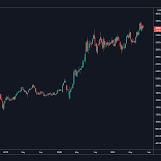We Think SoftTech Engineers (NSE:SOFTTECH) Is Taking Some Risk With Its Debt
Howard Marks put it nicely when he said that, rather than worrying about share price volatility, 'The possibility of permanent loss is the risk I worry about... and every practical investor I know worries about.' It's only natural to consider a company's balance sheet when you examine how risky it is, since debt is often involved when a business collapses. As with many other companies SoftTech Engineers Limited (NSE:SOFTTECH) makes use of debt. But the real question is whether this debt is making the company risky.
When Is Debt Dangerous?
Debt is a tool to help businesses grow, but if a business is incapable of paying off its lenders, then it exists at their mercy. In the worst case scenario, a company can go bankrupt if it cannot pay its creditors. However, a more usual (but still expensive) situation is where a company must dilute shareholders at a cheap share price simply to get debt under control. By replacing dilution, though, debt can be an extremely good tool for businesses that need capital to invest in growth at high rates of return. The first thing to do when considering how much debt a business uses is to look at its cash and debt together.
Check out our latest analysis for SoftTech Engineers
How Much Debt Does SoftTech Engineers Carry?
You can click the graphic below for the historical numbers, but it shows that as of September 2021 SoftTech Engineers had ₹340.6m of debt, an increase on ₹283.8m, over one year. However, because it has a cash reserve of ₹33.7m, its net debt is less, at about ₹306.9m.

How Strong Is SoftTech Engineers' Balance Sheet?
The latest balance sheet data shows that SoftTech Engineers had liabilities of ₹265.1m due within a year, and liabilities of ₹208.7m falling due after that. Offsetting this, it had ₹33.7m in cash and ₹726.7m in receivables that were due within 12 months. So it actually has ₹286.7m more liquid assets than total liabilities.
It's good to see that SoftTech Engineers has plenty of liquidity on its balance sheet, suggesting conservative management of liabilities. Given it has easily adequate short term liquidity, we don't think it will have any issues with its lenders.
We use two main ratios to inform us about debt levels relative to earnings. The first is net debt divided by earnings before interest, tax, depreciation, and amortization (EBITDA), while the second is how many times its earnings before interest and tax (EBIT) covers its interest expense (or its interest cover, for short). Thus we consider debt relative to earnings both with and without depreciation and amortization expenses.
SoftTech Engineers's debt is 4.8 times its EBITDA, and its EBIT cover its interest expense 2.8 times over. This suggests that while the debt levels are significant, we'd stop short of calling them problematic. Even worse, SoftTech Engineers saw its EBIT tank 58% over the last 12 months. If earnings continue to follow that trajectory, paying off that debt load will be harder than convincing us to run a marathon in the rain. When analysing debt levels, the balance sheet is the obvious place to start. But it is SoftTech Engineers's earnings that will influence how the balance sheet holds up in the future. So when considering debt, it's definitely worth looking at the earnings trend. Click here for an interactive snapshot.
Finally, a company can only pay off debt with cold hard cash, not accounting profits. So it's worth checking how much of that EBIT is backed by free cash flow. During the last three years, SoftTech Engineers burned a lot of cash. While that may be a result of expenditure for growth, it does make the debt far more risky.
Our View
On the face of it, SoftTech Engineers's conversion of EBIT to free cash flow left us tentative about the stock, and its EBIT growth rate was no more enticing than the one empty restaurant on the busiest night of the year. But on the bright side, its level of total liabilities is a good sign, and makes us more optimistic. Once we consider all the factors above, together, it seems to us that SoftTech Engineers's debt is making it a bit risky. That's not necessarily a bad thing, but we'd generally feel more comfortable with less leverage. The balance sheet is clearly the area to focus on when you are analysing debt. However, not all investment risk resides within the balance sheet - far from it. We've identified 5 warning signs with SoftTech Engineers (at least 2 which are concerning) , and understanding them should be part of your investment process.
At the end of the day, it's often better to focus on companies that are free from net debt. You can access our special list of such companies (all with a track record of profit growth). It's free.
New: Manage All Your Stock Portfolios in One Place
We've created the ultimate portfolio companion for stock investors, and it's free.
• Connect an unlimited number of Portfolios and see your total in one currency
• Be alerted to new Warning Signs or Risks via email or mobile
• Track the Fair Value of your stocks
Have feedback on this article? Concerned about the content? Get in touch with us directly. Alternatively, email editorial-team (at) simplywallst.com.
This article by Simply Wall St is general in nature. We provide commentary based on historical data and analyst forecasts only using an unbiased methodology and our articles are not intended to be financial advice. It does not constitute a recommendation to buy or sell any stock, and does not take account of your objectives, or your financial situation. We aim to bring you long-term focused analysis driven by fundamental data. Note that our analysis may not factor in the latest price-sensitive company announcements or qualitative material. Simply Wall St has no position in any stocks mentioned.
About NSEI:SOFTTECH
SoftTech Engineers
Develops software products and solutions for the architecture, engineering, operations, and construction sectors in India and internationally.
Excellent balance sheet with low risk.
Similar Companies
Market Insights
Weekly Picks


The Future of Social Sharing Is Private and People Are Ready


EU#3 - From Philips Management Buyout to Europe’s Biggest Company

Booking Holdings: Why Ground-Level Travel Trends Still Favor the Platform Giants


A fully integrated LNG business seems to be ignored by the market.
Recently Updated Narratives


The Oncology Anchor: Why Merck’s 46% Discount Defies the Keytruda Cliff


The Architect of Sovereignty: Palantir’s Premium Paradox at $149


BYLOT: Re-Rating Potential Tempered by UK Tax Drag and Speculative-Grade Debt Dynamics – Neutral (Hold)
Popular Narratives

Undervalued Key Player in Magnets/Rare Earth


NVDA: Expanding AI Demand Will Drive Major Data Center Investments Through 2026


AMZN: Acceleration In Cloud And AI Will Drive Margin Expansion Ahead
Trending Discussion


<b>Reported:</b> Revenue growth: 2024 → 2025 sharp increase of approx. 165%. Assuming moderate annual growth of 40%, a fair value in three years would be approx. $170. Given the customer base and the story, this should be possible. I find the most valuable “property” particularly interesting, as it solves the electricity problem.





